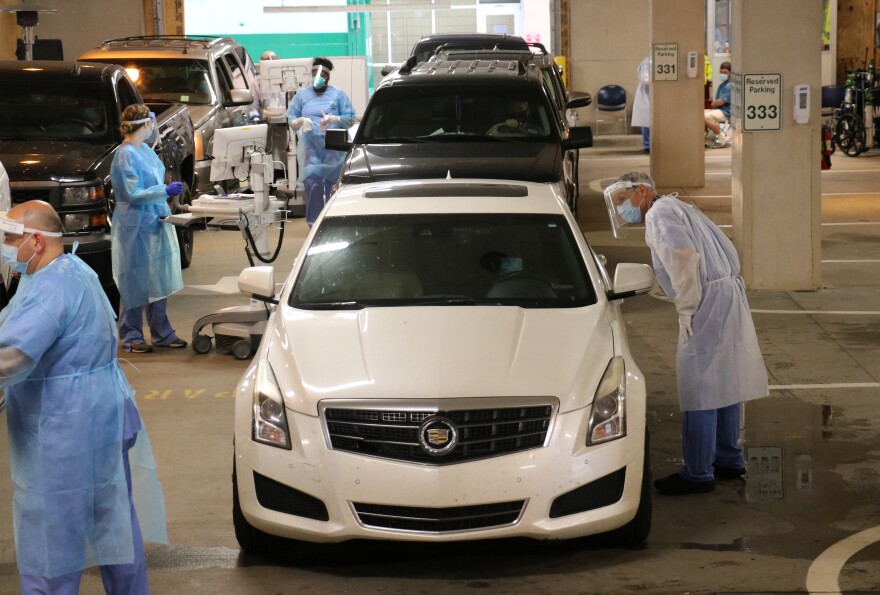As the coronavirus continues spreading through Arkansas, with daily records for new cases being repeatedly broken last week, more people are being tested for the virus. That’s causing longer lines at testing locations throughout the state.
The University of Arkansas for Medical Sciences reports it’s now averaging about 500 tests being conducted each weekday at its drive-thru triage location in Little Rock, an increase of about 30% since the beginning of July.
Frontline healthcare workers there say the pace is taking a toll on staff.
“It’s really hard for the team to be here day after day after day,” said Clinical Services Manager Deborah Hutts. “When we get here there’s a line, and when we wrap up, we all go home kind of exhausted.”

Each morning before cars start streaming through the garage where tests are conducted, the group of workers huddle together. They discuss any policy changes – which occur often – along with what practices have worked well and what needs to be done differently.
At 8 a.m. each day, traffic cones are removed and cars that are lined up outside begin pulling into the triage area. People showing symptoms of the virus, who have been exposed to someone who has tested positive or patients who have procedures scheduled at UAMS are questioned, their temperatures checked, and eventually swabs are inserted deep into their noses collecting samples to be tested.
Dr. Robert Hopkins, a professor of internal medicine and pediatrics at UAMS, is co-medical director of the screening program. He says the increase in people being tested is stretching their capacity.
“We’re keeping pace as best our facilities will allow us to do right now. One of our biggest limitations at present is we can only fit so many cars into a limited garage space. We then back up pretty quickly onto the road or onto parking lots,” Hopkins said. “So we’re actively looking at potential options to change the location where we can better serve the community without potentially impacting other things.”

Beginning next month, a mobile UAMS testing van will be traveling the state three days a week, focusing on rural and underserved areas.
At times Hopkins says they’ve encountered a shortage of testing supplies, but for now the facility has what it needs.
“Our supply chain folks here at UAMS have done a spectacular job of keeping up,” he said. “We’ve not run into a critical shortage, but we’ve had some spot shortages of different things, but we’ve worked around; found new ways to make it work.”
Dr. Michelle Krause, a professor of internal medicine and kidney specialist, helped set up this drive-thru testing site in early March as part of an effort to keep symptomatic patients out of emergency rooms or doctors’ offices. Large fans are continually blowing to keep the air moving as patients sitting in cars talk with doctors and nurses.
She said staff wear personal protective equipment and take steps to provide the highest level of protection possible.
“We’re masked with face shields, gowns and gloves. We are very careful in protecting our healthcare workers who do this,” Krause said. “We have them all tested and we have not had a single healthcare worker that we’re aware of down here that has tested positive from working in this location.”

Hopkins added that precautions are taken by the staff while putting on and taking off the protective gear at the start and end of their shifts. The steps are emphasized to people being trained.
“We’ve had a number of our learners come down here and the biggest comment we get from them is, ‘You guys are really strict,’ and it’s because you’re potentially exposed every day,” Hopkins said.
Efforts are made to conduct the testing in-house at UAMS, but when internal capacity is exceeded, the samples are sent to commercial labs. Priority is given to first responders, healthcare workers, people who are acutely ill or awaiting surgery.
Krause says in recent weeks the wait time for people sitting in vehicles to be tested at UAMS is typically three to four hours. That can present its own challenges.
“Sometimes we end up with more cars that break down in here or out there,” Krause said. “I think that’s the biggest thing when you’re waiting in line sometimes, you have more car trouble than anything.”

Despite the wait, Hopkins says the majority of patients are understanding.
“Most are very appreciative,” he said. “If you’ve waited in line in your car for a period of time you’re going to have a few grumpy folks. But for the most part, patients are very appreciative of the service. They’re very forthcoming. The biggest challenge is not having a public restroom easily available.”
The triage area is staffed by people from different areas of the hospital, with some working positions far outside their normal job roles. To help with the shortage of staff, officials say UAMS is hiring 12 additional people to work in the drive-thru testing area, some of whom started on Monday.
Steps have also been taken to make what can be a grueling work environment as pleasant as possible. Volunteers and state officials have at times provided lunch to the staff. The hospital occasionally gives away restaurant gift cards or UAMS swag. And in a corner of the triage area is a frozen slushy machine, which was donated by the food and beverage distributor company Ben E. Keith.
The testing site is open from 8 a.m. through 4:30 p.m. on weekdays and 8 a.m. to 12 p.m. on weekends. This location is limited to those who are symptomatic, have had exposure to someone who tested positive or are preparing for a medical procedure at UAMS. More information is available on the UAMS website.
KUAR receives direct financial support from the University of Arkansas for Medical Sciences through a partnership between UAMS and UA Little Rock. KUAR’s news coverage is editorial independent.






